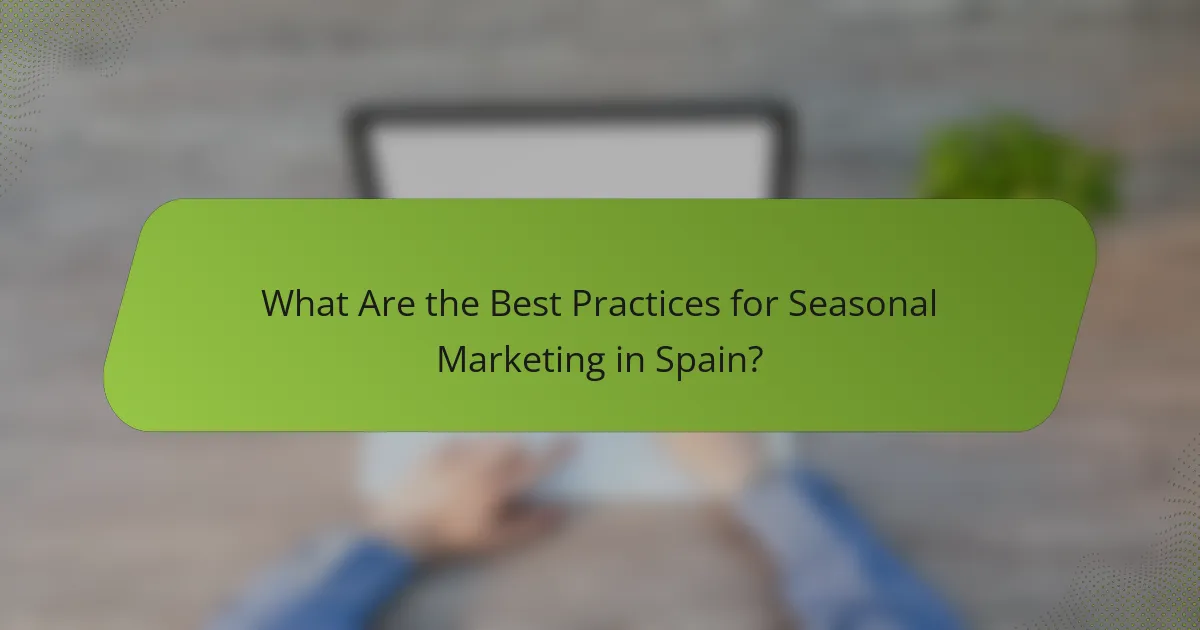Spain’s vibrant local markets present a wealth of seasonal business opportunities that thrive during specific times of the year, influenced by cultural festivities, agricultural harvests, and tourism influxes. By tapping into local consumer behavior and preferences, businesses can effectively align their offerings with market trends, ensuring they resonate with both residents and visitors alike.

What Are the Seasonal Business Opportunities in Spain?
Spain offers a variety of seasonal business opportunities that cater to both locals and tourists. These opportunities often peak during specific times of the year, driven by cultural events, agricultural cycles, and tourism trends.
Tourism-related services
Tourism-related services are a significant seasonal business opportunity in Spain, especially during the summer months when millions visit coastal areas and cities. Services such as guided tours, transportation, and accommodation rentals can see substantial demand.
Consider offering unique experiences, such as food tours or adventure activities, to attract tourists. Collaborating with local businesses can enhance your offerings and create a more comprehensive service package.
Agricultural products
Agricultural products provide seasonal opportunities, particularly during harvest times. Regions like Andalusia and Valencia are known for their fruits, vegetables, and olive oil, which can be sold at local markets or through direct-to-consumer channels.
Participating in farmers’ markets or establishing partnerships with local restaurants can help in promoting fresh produce. Be mindful of seasonal variations in crop yields to align your business with peak availability.
Local crafts and souvenirs
Local crafts and souvenirs are popular among tourists seeking authentic Spanish experiences. Items such as ceramics, textiles, and handmade jewelry can be sold in shops or at local fairs, especially during festivals.
To succeed, focus on high-quality craftsmanship and unique designs that reflect local culture. Seasonal events can be excellent opportunities to showcase your products and attract buyers.
Event planning
Event planning is a thriving seasonal business in Spain, particularly during summer and festive periods. Weddings, festivals, and corporate events often require planning services, catering, and entertainment.
Building a network of reliable vendors and understanding local regulations can streamline your operations. Offering tailored packages for different types of events can also help attract a diverse clientele.
Food and beverage offerings
Food and beverage offerings are essential seasonal business opportunities, especially in tourist-heavy areas. Seasonal menus featuring local ingredients can draw in customers looking for authentic culinary experiences.
Consider hosting pop-up restaurants or food stalls at local events to increase visibility. Adapting your offerings based on seasonal trends can help maintain customer interest throughout the year.

How to Identify Local Market Trends in Spain?
Identifying local market trends in Spain involves analyzing consumer behavior, preferences, and emerging patterns in specific regions. Key methods include utilizing market research tools, leveraging social media insights, and engaging with local communities to gather relevant data.
Market research tools
Market research tools are essential for gathering data on consumer preferences and behaviors. In Spain, platforms like Statista and Euromonitor provide valuable insights into market dynamics and trends across various sectors. Additionally, surveys and focus groups can yield qualitative data that reflects local consumer sentiments.
Consider using online survey tools such as SurveyMonkey or Google Forms to reach a broader audience. Aim for a sample size that reflects the demographic diversity of the area you are targeting, ensuring that your findings are representative of local trends.
Social media insights
Social media platforms are powerful for understanding local market trends in Spain. Tools like Hootsuite and Sprout Social can help analyze engagement metrics and audience demographics. By monitoring conversations and trends on platforms like Instagram and Facebook, businesses can identify what resonates with local consumers.
Regularly track hashtags and local influencers to gauge popular products or services. This can provide insights into emerging trends and consumer interests, allowing businesses to adapt their offerings accordingly.
Local community engagement
Engaging with local communities is crucial for identifying market trends. Attend local events, fairs, and markets to interact directly with consumers and observe their preferences. This face-to-face engagement can provide immediate feedback and foster relationships that enhance brand loyalty.
Consider forming partnerships with local organizations or businesses to gain deeper insights into community needs. Conducting informal interviews or discussions can reveal valuable information about consumer expectations and potential gaps in the market.

What Are the Best Practices for Seasonal Marketing in Spain?
Effective seasonal marketing in Spain involves understanding local customs and consumer behavior while leveraging timely promotions. Businesses should focus on targeted strategies that resonate with their audience during peak seasons.
Targeted advertising strategies
Targeted advertising strategies are essential for reaching the right audience during seasonal peaks in Spain. Utilize social media platforms like Facebook and Instagram, where you can segment audiences based on demographics, interests, and behaviors. Consider seasonal keywords in your ads to enhance visibility.
For example, during the summer months, highlight beach-related products or services, and during the holiday season, focus on gift ideas. A/B testing different ad formats can help identify which strategies yield the best engagement rates.
Collaborations with local influencers
Collaborating with local influencers can significantly amplify your seasonal marketing efforts in Spain. Influencers have established trust with their followers, making their endorsements more impactful. Choose influencers whose audience aligns with your target market for maximum effect.
For instance, partnering with a food blogger during the Christmas season to promote traditional Spanish holiday dishes can attract attention to your restaurant or catering service. Ensure that the influencer’s style matches your brand for a cohesive message.
Seasonal promotions and discounts
Seasonal promotions and discounts are effective tools for driving sales during specific times of the year in Spain. Offering limited-time discounts or special bundles can create a sense of urgency among consumers. Consider using local holidays, such as La Tomatina or Semana Santa, as themes for your promotions.
For example, a clothing store might offer a “Back to School” sale in late August, providing discounts on school supplies and apparel. Ensure that your promotions are well-advertised through both online and offline channels to maximize reach.

How to Choose the Right Seasonal Business Model?
Choosing the right seasonal business model involves understanding local market dynamics, consumer preferences, and operational feasibility. Focus on aligning your business idea with the specific needs and opportunities present in Spain’s local markets during peak seasons.
Assessing local demand
To assess local demand, start by researching seasonal trends and consumer behavior in your target area. Consider factors such as tourism patterns, local festivals, and seasonal products that are popular among residents and visitors alike.
Utilize surveys, social media insights, and local market reports to gauge interest. For example, if you’re in a coastal town, beach-related services or products may see higher demand during the summer months.
Evaluating competition
Evaluating competition requires analyzing existing businesses that offer similar products or services. Identify key players in your niche and assess their strengths and weaknesses.
Visit local markets and online platforms to observe pricing strategies, customer engagement, and product offerings. This will help you find gaps in the market or areas where you can differentiate your business, such as unique product features or superior customer service.
Understanding regulatory requirements
Understanding regulatory requirements is crucial for operating legally in Spain’s local markets. Research necessary permits, licenses, and health regulations specific to your business type.
For instance, food-related businesses may need to comply with health and safety standards, while retail operations might require specific trading licenses. Consult local government websites or business associations for detailed guidance on compliance.

What Are the Key Challenges for Seasonal Businesses in Spain?
Seasonal businesses in Spain face several key challenges that can impact their success. These include market saturation, supply chain issues, and fluctuating consumer demand, all of which require careful management and strategic planning.
Market saturation
Market saturation occurs when the number of businesses offering similar seasonal products or services exceeds consumer demand. In popular tourist areas, this can lead to intense competition, driving prices down and reducing profit margins.
To navigate market saturation, businesses should focus on differentiating their offerings. This could involve unique product features, exceptional customer service, or targeting niche markets. Conducting thorough market research can help identify gaps that can be exploited.
Supply chain issues
Supply chain issues can significantly disrupt seasonal businesses, especially those relying on timely delivery of goods. Delays in shipping, shortages of raw materials, or increased costs can hinder operations and affect customer satisfaction.
To mitigate these risks, businesses should establish strong relationships with multiple suppliers and consider local sourcing where possible. Implementing inventory management systems can also help track stock levels and forecast demand, ensuring that products are available when needed.
